与than的短语;be 不定式的 用法汇编
- 格式:ppt
- 大小:108.50 KB
- 文档页数:12
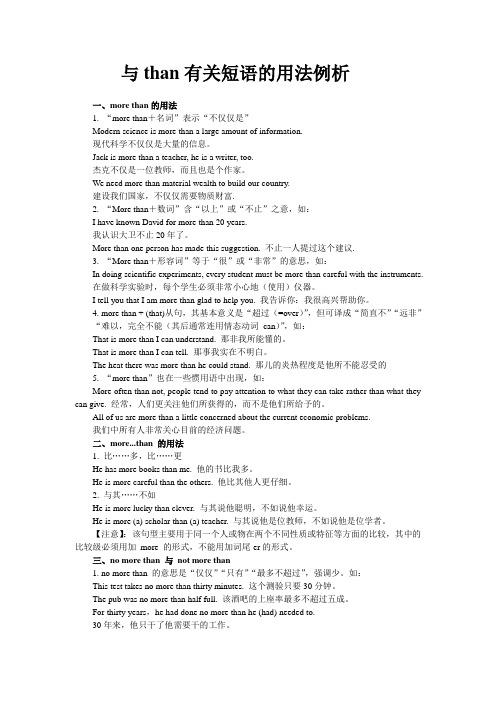
与than有关短语的用法例析一、more than的用法1. “more than+名词”表示“不仅仅是”Modern science is more than a large amount of information.现代科学不仅仅是大量的信息。
Jack is more than a teacher, he is a writer, too.杰克不仅是一位教师,而且也是个作家。
We need more than material wealth to build our country.建设我们国家,不仅仅需要物质财富.2. “More than+数词”含“以上”或“不止”之意,如:I have known David for more than 20 years.我认识大卫不止20年了。
More than one person has made this suggestion. 不止一人提过这个建议.3. “More than+形容词”等于“很”或“非常”的意思,如:In doing scientific experiments, every student must be more than careful with the instruments.在做科学实验时,每个学生必须非常小心地(使用)仪器。
I tell you that I am more than glad to help you. 我告诉你:我很高兴帮助你。
4. more than + (that)从句,其基本意义是“超过(=over)”,但可译成“简直不”“远非”“难以,完全不能(其后通常连用情态动词can)”,如:That is more than I can understand. 那非我所能懂的。
That is more than I can tell. 那事我实在不明白。
The heat there was more than he could stand. 那儿的炎热程度是他所不能忍受的5. “more than”也在一些惯用语中出现,如:More often than not, people tend to pay attention to what they can take rather than what they can give. 经常,人们更关注他们所获得的,而不是他们所给予的。
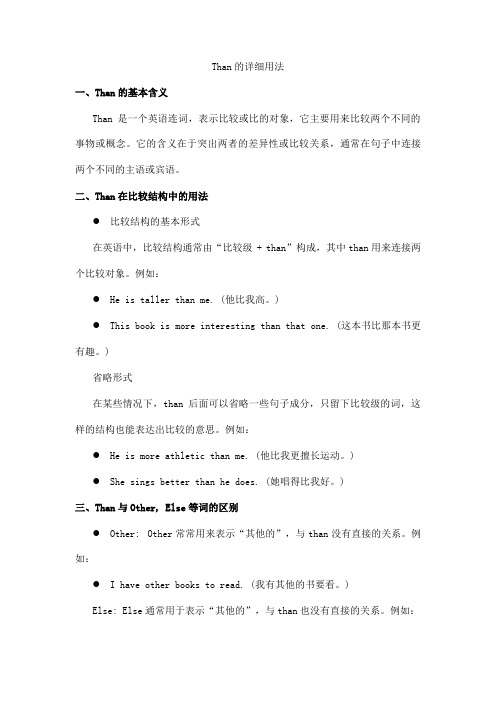
Than的详细用法一、Than的基本含义Than是一个英语连词,表示比较或比的对象,它主要用来比较两个不同的事物或概念。
它的含义在于突出两者的差异性或比较关系,通常在句子中连接两个不同的主语或宾语。
二、Than在比较结构中的用法●比较结构的基本形式在英语中,比较结构通常由“比较级 + than”构成,其中than用来连接两个比较对象。
例如:●He is taller than me. (他比我高。
)●This book is more interesting than that one. (这本书比那本书更有趣。
)省略形式在某些情况下,than后面可以省略一些句子成分,只留下比较级的词,这样的结构也能表达出比较的意思。
例如:●He is more athletic than me. (他比我更擅长运动。
)●She sings better than he does. (她唱得比我好。
)三、Than与Other, Else等词的区别●Other: Other常常用来表示“其他的”,与than没有直接的关系。
例如:●I have other books to read. (我有其他的书要看。
)Else: Else通常用于表示“其他的”,与than也没有直接的关系。
例如:●What else do you want to know? (你还想知道什么其他的?)四、Than在固定搭配中的使用●比较级 + than + 不定代词:这种结构表示某个事物的某个方面超过其他事物。
例如:●She has more money than anyone else. (她比其他任何人都有钱。
)比较级 + than + 副词:这种结构用于表示比较关系,通常放在动词后面。
例如:●She studies harder than ever before. (她比以前更加努力地学习。
)倍数 + 比较级 + than:这种结构用于表示某事物是另一事物的几倍大小或程度。

other-than用法归纳other than 的用法A. other than“不同于”“并非”,表示这一意思时,other than 组成的短语。
在句中可作表语或定语。
1 )The truth is quite other than what you think.事实真相和你想的完全不同。
2 )Certainly, my associates and pursuits shall be other than they have been.当然,现在我所来往的人,我所追求的事物,将和以前不同。
3 ) Here is a IC card other than yours.这里有一张的IC 卡,不是你的。
(原意为:这里有一张不同于你的IC 卡)4 ) Reactions other than the desired one often occur when the reactants are brought together.当这些反应物放在一起时,常发生不希望有的一些反应。
(原意为:当这些反应物放在一起时,常发生与希望有的反应不同的反应。
)B. other than用于表示“除……之外”,相当于except。
其用法如下:other than置于名词之后,表示“除……之外,其他都……”的意思。
此时,other than 组成的短语在句中作定语,修饰前面的名词。
1 ) The presence of elements other than iron will greatly affect the physical properties of steel.除铁以外的其它元素的存在将大大影响钢的物理性质。
2 ) Cruises other than the ones listed below are not discounted at this time.在这段期间,除下列所列的邮轮外,其他邮轮都不打折。
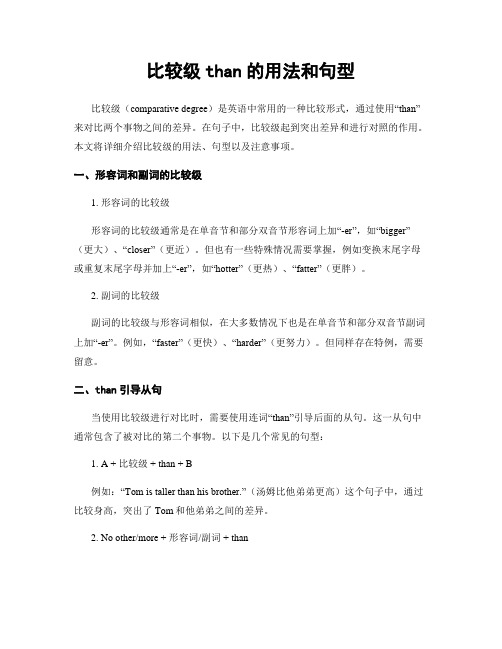
比较级than的用法和句型比较级(comparative degree)是英语中常用的一种比较形式,通过使用“than”来对比两个事物之间的差异。
在句子中,比较级起到突出差异和进行对照的作用。
本文将详细介绍比较级的用法、句型以及注意事项。
一、形容词和副词的比较级1. 形容词的比较级形容词的比较级通常是在单音节和部分双音节形容词上加“-er”,如“bigger”(更大)、“closer”(更近)。
但也有一些特殊情况需要掌握,例如变换末尾字母或重复末尾字母并加上“-er”,如“hotter”(更热)、“fatter”(更胖)。
2. 副词的比较级副词的比较级与形容词相似,在大多数情况下也是在单音节和部分双音节副词上加“-er”。
例如,“faster”(更快)、“harder”(更努力)。
但同样存在特例,需要留意。
二、than引导从句当使用比较级进行对比时,需要使用连词“than”引导后面的从句。
这一从句中通常包含了被对比的第二个事物。
以下是几个常见的句型:1. A + 比较级 + than + B例如:“Tom is taller than his brother.”(汤姆比他弟弟更高)这个句子中,通过比较身高,突出了Tom和他弟弟之间的差异。
2. No other/more + 形容词/副词 + than例如:“No other country is more beautiful than Switzerland.”(没有其他国家比瑞士更美)。
这样的句型用于强调某一事物在某方面的超群之处。
3. 形容词/副词(+ enough)+ to 是句型例如:“She is old enough to take care of herself.”(她已经足够大,可以自己照顾自己)。
这个句子中,“old enough”表示达到了能够独立自主的年龄。
4. the + 比较级 + of the two/three...例如:“This book is the most interesting of the three.”(这本书是三本书中最有趣的一本)。
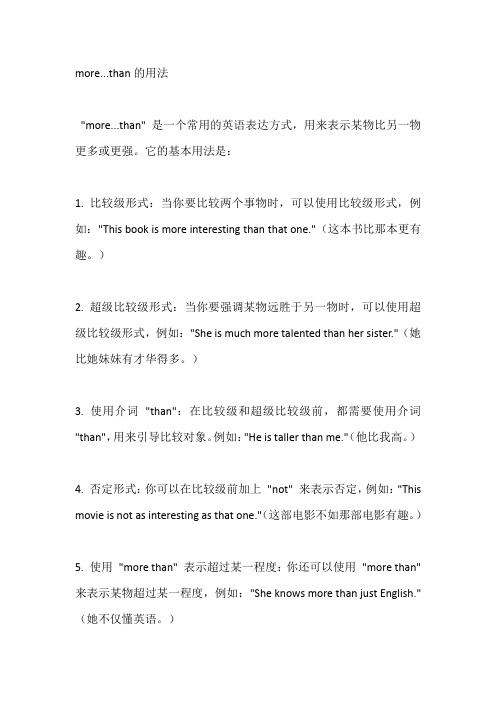
more...than的用法"more...than" 是一个常用的英语表达方式,用来表示某物比另一物更多或更强。
它的基本用法是:1. 比较级形式:当你要比较两个事物时,可以使用比较级形式,例如:"This book is more interesting than that one."(这本书比那本更有趣。
)2. 超级比较级形式:当你要强调某物远胜于另一物时,可以使用超级比较级形式,例如:"She is much more talented than her sister."(她比她妹妹有才华得多。
)3. 使用介词"than":在比较级和超级比较级前,都需要使用介词"than",用来引导比较对象。
例如:"He is taller than me."(他比我高。
)4. 否定形式:你可以在比较级前加上"not" 来表示否定,例如:"This movie is not as interesting as that one."(这部电影不如那部电影有趣。
)5. 使用"more than" 表示超过某一程度:你还可以使用"more than" 来表示某物超过某一程度,例如:"She knows more than just English."(她不仅懂英语。
)6. 使用"more than" 表示不仅仅:此外,"more than" 还可以表示不仅仅,例如:"It's more than just a game."(这不仅仅是一场游戏。
)希望这些解释能帮助你更好地理解"more...than" 的用法。

Than的用法一、后接人称代词用主格还是宾格由于than既可用作连词也可用作介词,所以当后接人称代词时,可用主格也可用宾格.通常认为在正式文体中多用主格,在口语或非正式文体中多用宾语.如:Everyone here is taller than I [me]. 这儿的每一个人都比我高.Her sister swims faster than she [her]. 她姐姐游泳比她快.但是,若人称代词之后跟有动词,则只能用主格.如:Everyone here is taller than I am. 这儿的每一个人都比我高.Her sister swims faster than she does. 她姐姐游泳比她快.注意:有时用主格或宾格会导致意思的变化.比较:I love you more than he (likes you). 我比他更爱你.I love you more than (he likes) him. 我爱你胜过爱他.二、后接动词用不定式还是-ing分词1. 当连接两个非谓语动词时,通常应使用一样的形式.如:It is much easier to get into debt than to get out of it. 借债容易还债难.He likes playing chess more than watching TV. 与看电视相比,他更喜欢下棋.比较:He thinks it is safer to drive himself than (to) let me drive.=He thinks that driving himself is safer than letting me drive. 他认为他自己开车比让我开车要更安全些.2. 若不是连接两个非谓语动词,则其后出现的动词通常用-ing分词形式(虽然也可用不定式,但不如用-ing分词普通).如:There are worse calamities than failing your driving test. 比起你驾驶考试不合格来说,更大的灾难还多着呢.Nothing gives me more pleasure than listening to Mozart. 再没有比听莫扎特的乐曲更让我高兴的事了.Nothing is more unpleasant than finding [to find] insects in your bath. 最使人不快的是在浴室里发现有虫子.三、引导比较状语从句的时态问题若than引导的比较状语从句与主句动作不一致,可以根据情况使用适当的时态形式.如:He drives faster than he did a year ago. 他开车比一年以前快了.The house is rather bigger than we thought. 这所房子比我们想的大得多.若主句为将来时,than引导的从句可用现在时态表示将来,也可直接使用将来时态.如:We’ll probably drive faster than you do [will]. 我们开车可能会比你们快.四、引导比较状语从句的倒装问题than引导比较状语从句时,从句语序通常不需倒装,但在正式文体中,有时也可倒装.如:City dweller have a higher death rate than country people do.=City dweller have a higher death rate than do country people. 城市居民死亡率比农村居民高.五、引导比较状语从句且在从句中充当成分有时可引导一个从句并在从句中充当句子成分(主语、宾语、表语),为便于理解,有时可视为than后省略了what:We don’t want to do more than is necessary. 我们不想做不必要的事情.The pain was almost more than he could bear. 这样的痛苦几乎使他受不了.She’s not a very good manager she always spends more money than she earns. 她不大会理财——总是入不敷出.Life here is much easier than it used to be. 如今在此地生活比起从前可舒服多了. 比较下面一句,than后的expected为省略结构:He returned three days earlier than (he was) expected. 他回来得比预料的要早三天.六、后接时间或条件状语从句若语义需要,有时其后可接when引导的时间状语从句以及if 引导的条件状语从句.如:You are a little fatter than when I saw you last. 你比我上次见你时胖点了.Joe carries only nine pounds more than when he was twenty. 乔比他20岁时只重了九磅.They work better together than if they are alone. 他们一起干比他们单干效果要好.七、同质比较还是异质比较than 通常用于两个不同的人或物在同一方面进行比较,但有时指的可能是同一个人或物在两个不同的方面进行比较,此时只用于more…than…结构,而不能用–er…than…的形式(即使是单音节也是如此),这类结构通常可译为“与其……不如……”“有……无……”.如:He’s more fat than short. 与其说他矮不如说他胖.They are more brave than wise. 他们有勇无谋.If we tell him about it, it may do more harm than good. 倘若我们把情况告诉他,那可能弊多利少.八、与never (a) 连用时如何理解有时than与带有never (a) 的比较级结构连用,表示强调,通常表示最高级的含义.如:I’ve never had a worse morning than today. 我哪一天早上也不像今天早上这样倒霉. 若意思明确,有时可省略than结构.如:He is fine, never better. 他很好,比以往任何时候都好.I’ve never seen a finer bird. 我从未见过比这更美的鸟.I’ve never found a better job. 这是我找到的最好的工作.九、than any other后接名词用单数还是复数than any other后接名词时通常用单数形式,很少用复数.如:He swims faster than any other student in his class. 他比班上的其他任何学生都游得快.More heat is lost through the head than any other part of the body. 从头部散发的热量比身体的其他任何部位都多.十、几组容易理解出错的than习语1.“no +比较级+than”与“not +比较级+than”(1) “no +比较级+than”用于否定两者,表示“与……一样不”,其义大致相当于其中形容词或副词的反义词用于as…as…结构.如:He is no richer than a beggar.=He is as poor as a beggar. 他穷如乞丐.This one is no better than that one.=This one is as bad as that one. 这个与那个一样不好.(2) “not +比较级+than”的意思是“不比……更”“不如”.如:He is not richer than you. 他不如你富有.This one is not better than that one. 这个不如那个好。
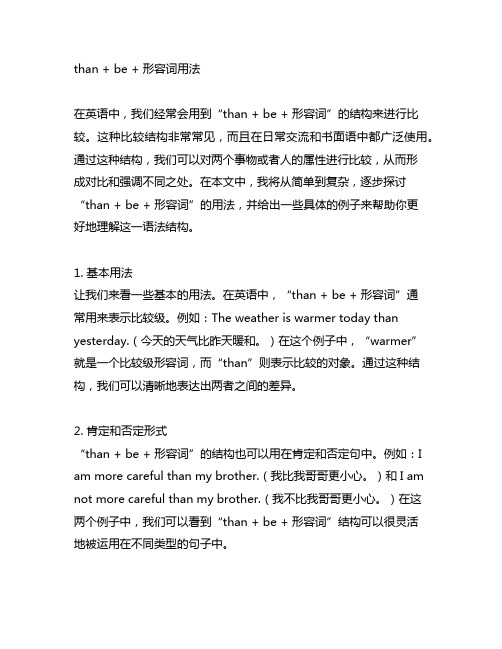
than + be + 形容词用法在英语中,我们经常会用到“than + be + 形容词”的结构来进行比较。
这种比较结构非常常见,而且在日常交流和书面语中都广泛使用。
通过这种结构,我们可以对两个事物或者人的属性进行比较,从而形成对比和强调不同之处。
在本文中,我将从简单到复杂,逐步探讨“than + be + 形容词”的用法,并给出一些具体的例子来帮助你更好地理解这一语法结构。
1. 基本用法让我们来看一些基本的用法。
在英语中,“than + be + 形容词”通常用来表示比较级。
例如:The weather is warmer today than yesterday.(今天的天气比昨天暖和。
)在这个例子中,“warmer”就是一个比较级形容词,而“than”则表示比较的对象。
通过这种结构,我们可以清晰地表达出两者之间的差异。
2. 肯定和否定形式“than + be + 形容词”的结构也可以用在肯定和否定句中。
例如:I am more careful than my brother.(我比我哥哥更小心。
)和I am not more careful than my brother.(我不比我哥哥更小心。
)在这两个例子中,我们可以看到“than + be + 形容词”结构可以很灵活地被运用在不同类型的句子中。
3. 形容词的比较级和最高级除了单纯表示比较外,“than + be + 形容词”还可以用来表示形容词的比较级和最高级。
例如:She is smarter than anyone in the class.(她比班里的任何人都聪明。
)在这个例子中,“smarter”表示最高级,而“than”连接了两个被比较的对象。
通过这种结构,我们可以清楚地表达出某一事物在同类中的优劣。
4. 与名词连用“than + be + 形容词”结构也可以与名词连用,从而表示两个事物在某一方面相比的差异。
例如:He is more patient than his wife.(他比他的妻子更有耐心。

rather a than b的用法“Rather than”在英语中是一个非常常见的短语,可以在许多种情况下使用。
该短语通常表示选择a而不是b,或者表示相比于b,a更好、更重要、更受欢迎、更适合等等。
下面是更详细的说明。
“Rather than”作为连词。
- I prefer walking rather than driving.- She would rather stay home than go out with her friends.这些例句中,“rather than”用于比较两种不同的选择,并且表示首选项。
在第一个例句中,人们可以选择步行或开车,但是说话者更喜欢步行。
在第二个例句中,女孩可以选择待在家里或跟朋友出去玩,但是她更喜欢待在家里。
“Rather than”作为介词。
在某些情况下,“rather than”可以用作介词。
在这种情况下,它与一个名词或动名词短语一起使用,并用于表示选择一个东西而不是另一个东西,或者与其它人或事物相比较更好或更适合。
例如:- She would eat vegetables rather than meat.- He chose a book rather than a movie.在这些例句中,“rather than”后面跟着表示不同选择的名词或动名词短语。
在第一个例句中,女孩选择吃蔬菜而不是肉。
在第二个例句中,男孩选择读书而不是看电影。
“Rather than”作为形容词。
在某些情况下,人们会使用“rather than”作为形容词来描述某物或某人更好或更合适。
例如:- This dress is rather than that one.- John is a rather than a follower.这些例句中,“rather than”用于形容物品或人,表示它们更好、更合适、更重要等等。
在第一个例句中,人们表示这件衣服比其他那件更好。
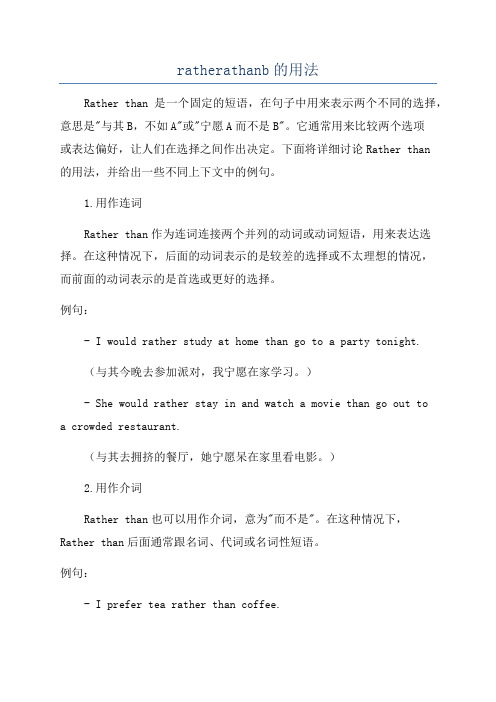
ratherathanb的用法Rather than是一个固定的短语,在句子中用来表示两个不同的选择,意思是"与其B,不如A"或"宁愿A而不是B"。
它通常用来比较两个选项或表达偏好,让人们在选择之间作出决定。
下面将详细讨论Rather than的用法,并给出一些不同上下文中的例句。
1.用作连词Rather than作为连词连接两个并列的动词或动词短语,用来表达选择。
在这种情况下,后面的动词表示的是较差的选择或不太理想的情况,而前面的动词表示的是首选或更好的选择。
例句:- I would rather study at home than go to a party tonight.(与其今晚去参加派对,我宁愿在家学习。
)- She would rather stay in and watch a movie than go out toa crowded restaurant.(与其去拥挤的餐厅,她宁愿呆在家里看电影。
)2.用作介词Rather than也可以用作介词,意为"而不是"。
在这种情况下,Rather than后面通常跟名词、代词或名词性短语。
例句:- I prefer tea rather than coffee.(我宁愿喝茶而不是咖啡。
)- He would choose to read a book rather than watch TV.(他宁愿读书而不是看电视。
)3.用作副词Rather than还可以用作副词,表示程度或偏好。
在这种情况下,Rather than修饰形容词或副词,表达比较、相对或在其中一种程度上的偏好。
例句:- She is rather tired after a long day at work.(工作一整天后她有点累。
)- It's rather cold outside, so remember to wear a coat.(外面有点冷,记得穿上外套。

than的用法总结大全(学习版)编制人:__________________审核人:__________________审批人:__________________编制学校:__________________编制时间:____年____月____日序言下载提示:该文档是本店铺精心编制而成的,希望大家下载后,能够帮助大家解决实际问题。
文档下载后可定制修改,请根据实际需要进行调整和使用,谢谢!并且,本店铺为大家提供各种类型的经典范文,如英语单词、英语语法、英语听力、英语知识点、语文知识点、文言文、数学公式、数学知识点、作文大全、其他资料等等,想了解不同范文格式和写法,敬请关注!Download tips: This document is carefully compiled by this editor.I hope that after you download it, it can help you solve practical problems. The document can be customized and modified after downloading, please adjust and use it according to actual needs, thank you!In addition, this shop provides various types of classic sample essays, such as English words, English grammar, English listening, English knowledge points, Chinese knowledge points, classical Chinese, mathematical formulas, mathematics knowledge points, composition books, other materials, etc. Learn about the different formats and writing styles of sample essays, so stay tuned!than的用法总结大全than的意思conj. 比(用于比较级),宁愿…而不愿,除…以外,一…就prep. 超过,比than用法than可以用作连词than用作连词的意思是“比”,可指两个不同的人或物在同一方面进行比较,也可指同一个人或物在两个不同方面进行比较。
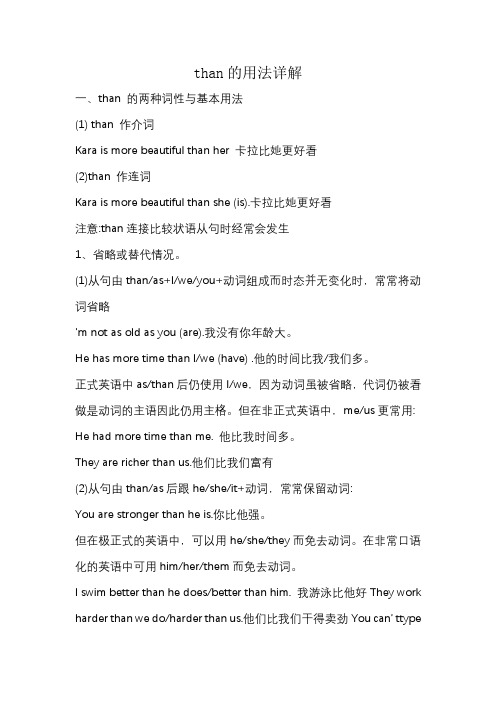
than的用法详解一、than 的两种词性与基本用法(1) than 作介词Kara is more beautiful than her 卡拉比她更好看(2)than 作连词Kara is more beautiful than she (is).卡拉比她更好看注意:than连接比较状语从句时经常会发生1、省略或替代情况。
(1)从句由than/as+l/we/you+动词组成而时态并无变化时,常常将动词省略’m not as old as you (are).我没有你年龄大。
He has more time than l/we (have) .他的时间比我/我们多。
正式英语中as/than后仍使用I/we,因为动词虽被省略,代词仍被看做是动词的主语因此仍用主格。
但在非正式英语中,me/us更常用: He had more time than me. 他比我时间多。
They are richer than us.他们比我们富有(2)从句由than/as后跟he/she/it+动词,常常保留动词:You are stronger than he is.你比他强。
但在极正式的英语中,可以用he/she/they而免去动词。
在非常口语化的英语中可用him/her/them而免去动词。
I swim better than he does/better than him. 我游泳比他好They work harder than we do/harder than us.他们比我们干得卖劲You can’ ttypeas fast as I can/as fast as me. 你打字不如我快(3)当than/as的前后所用动词相同时,常可以用助动词代替第二个动词:l earn less than he does. 我比他钱挣得少He knows more than I did at his age. 他要比我在他这个年龄时懂得多City dwellers have a higher death rate than country people do.城市居民比乡里人死更高。
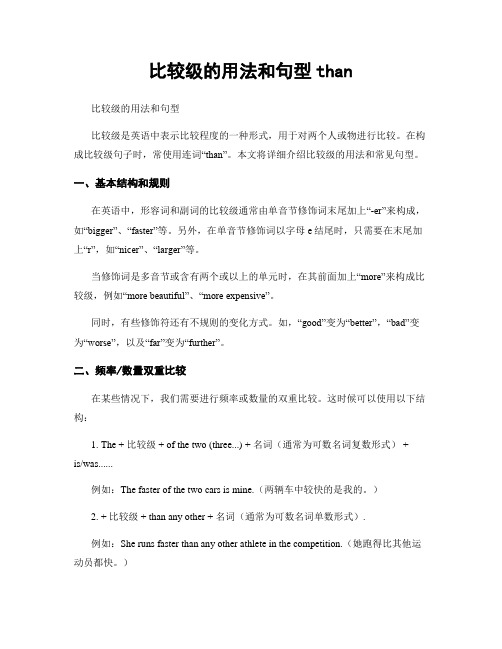
比较级的用法和句型than比较级的用法和句型比较级是英语中表示比较程度的一种形式,用于对两个人或物进行比较。
在构成比较级句子时,常使用连词“than”。
本文将详细介绍比较级的用法和常见句型。
一、基本结构和规则在英语中,形容词和副词的比较级通常由单音节修饰词末尾加上“-er”来构成,如“bigger”、“faster”等。
另外,在单音节修饰词以字母e结尾时,只需要在末尾加上“r”,如“nicer”、“larger”等。
当修饰词是多音节或含有两个或以上的单元时,在其前面加上“more”来构成比较级,例如“more beautiful”、“more expensive”。
同时,有些修饰符还有不规则的变化方式。
如,“good”变为“better”,“bad”变为“worse”,以及“far”变为“further”。
二、频率/数量双重比较在某些情况下,我们需要进行频率或数量的双重比较。
这时候可以使用以下结构:1. The + 比较级 + of the two (three...) + 名词(通常为可数名词复数形式) +is/was......例如:The faster of the two cars is mine.(两辆车中较快的是我的。
)2. + 比较级 + than any other + 名词(通常为可数名词单数形式).例如:She runs faster than any other athlete in the competition.(她跑得比其他运动员都快。
)三、数量/程度双重比较有时,我们需要同时对数量或程度进行比较。
下面是一些常见的句型:1. The more + 形容词/副词(原级) , the more + 形容词/副词(原级).例如:The more you practice, the better you will become.(你练习得越多,你会变得越好。
)2. The less + 形容词/副词(原级), the less + 形容词/副词(原级).例如:The less you worry, the happier you will be.(你担心得越少,你会变得越开心。
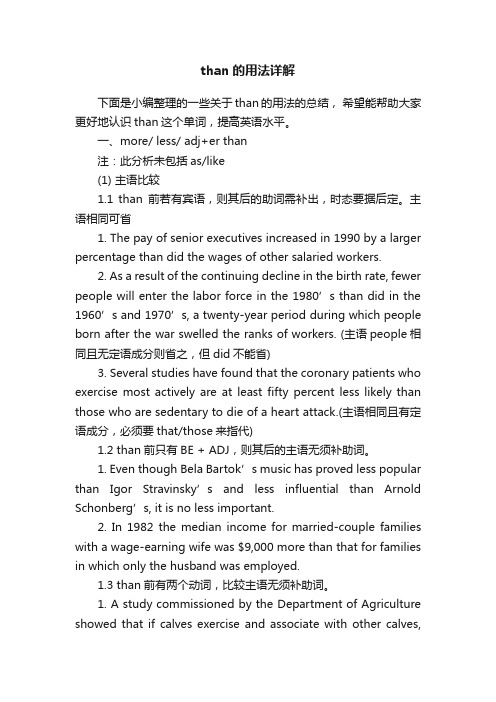
than的用法详解下面是小编整理的一些关于than的用法的总结,希望能帮助大家更好地认识than这个单词,提高英语水平。
一、more/ less/ adj+er than注:此分析未包括as/like(1) 主语比较1.1 than前若有宾语,则其后的助词需补出,时态要据后定。
主语相同可省1. The pay of senior executives increased in 1990 by a larger percentage than did the wages of other salaried workers.2. As a result of the continuing decline in the birth rate, fewer people will enter the labor force in the 1980’s than did in the 1960’s and 1970’s, a twenty-year period during which people born after the war swelled the ranks of workers. (主语people相同且无定语成分则省之,但did不能省)3. Several studies have found that the coronary patients who exercise most actively are at least fifty percent less likely than those who are sedentary to die of a heart attack.(主语相同且有定语成分,必须要that/those来指代)1.2 than前只有BE + ADJ,则其后的主语无须补助词。
1. Even though Bela Bartok’s music has proved less popular than Igor Stravinsky’s and less influential than Arnold Schonberg’s, it is no less important.2. In 1982 the median income for married-couple families with a wage-earning wife was $9,000 more than that for families in which only the husband was employed.1.3 than前有两个动词,比较主语无须补助词。
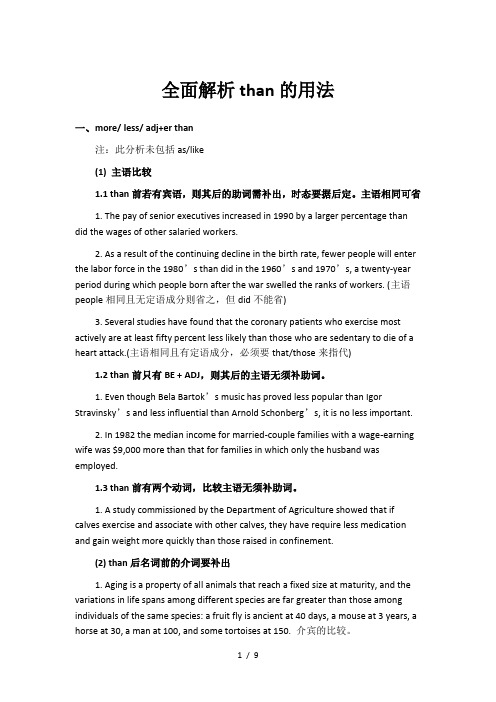
全面解析than的用法一、more/ less/ adj+er than注:此分析未包括as/like(1) 主语比较1.1 than前若有宾语,则其后的助词需补出,时态要据后定。
主语相同可省1. The pay of senior executives increased in 1990 by a larger percentage than did the wages of other salaried workers.2. As a result of the continuing decline in the birth rate, fewer people will enter the labor force in the 1980’s than did in the 1960’s and 1970’s, a twenty-year period during which people born after the war swelled the ranks of workers. (主语people相同且无定语成分则省之,但did不能省)3. Several studies have found that the coronary patients who exercise most actively are at least fifty percent less likely than those who are sedentary to die of a heart attack.(主语相同且有定语成分,必须要that/those来指代)1.2 than前只有BE + ADJ,则其后的主语无须补助词。
1. Even though Bela Bartok’s music has proved less popular than Igor Stravinsky’s and less influential than Arnold Schonberg’s, it is no less important.2. In 1982 the median income for married-couple families with a wage-earning wife was $9,000 more than that for families in which only the husband was employed.1.3 than前有两个动词,比较主语无须补助词。
![[全]与than搭配的42个常见短语(附词典例句)](https://img.taocdn.com/s1/m/ca856c36700abb68a882fb57.png)
与than搭配的42个常见短语(附词典例句)分为两个部分:第一部分——简洁版第二部分——附例句第一部分——简洁版1.more than 超过;在…以上(尤用于强调实际数多么大);超出需要;超乎寻常2.no more than只不过/仅仅;至多/不到(相当于little more than)(用于强调并不重要)3.little more than 仅仅;只不过是4.nothing more than 不比…复杂;仅仅;只不过是5.not more than 在…以下,不超过,不到(尤用于强调实际数目多么小)no/not more than sth不超过/至多6.more…than 与更像(前者)地;与其说(是)…,倒不如说(是)…7.no more…than 根本不…;完全不…8.more often than not (相当于as often as not, most of the time)(口)多半;往往;通常;一贯;在多数情况下9.more than a little (正式)相当;非常;十分10.more than happy, welcome, likely, glad, ready etc. 十分;很;非常,极其(相当于very)11.more than sb can/could 无法12.be more of sth than 与其说…不如说…13.less than (用在数字或数量前)少于/低于/比…少;好不/完全不/一点都不;缺少/缺乏14.be less a…than a…(= be not no so much like one thing as another) 不是…更像…15.no less than 不少于/不低于;多至/多达(表示数目的惊人之多)16.nothing less than(用于强调某事物的重要性或严重性)无异于/不亚于,完全/简直/全然;简直是/绝对是17.be nothing short of/less than sth简直是某事物,无异于某事物(用于强调程度)18.less…than 不像…(更像…);与其说…(倒不如说…)19.in less than no time极快地;很快地;迅速地;一眨眼功夫20.other than除了…外(还)(相当于in addition to);除了…外(相当于except, except for)(通常用于否定句,正式)不/不同/不同于(相当于not, different(ly) from)21.no other than 除…外没有;只有;正是;就是;不是别的而正是22.none other than 正是;就是none other than sb23.nothing other than 除…外没有;只有24.rather than 而不是/而非(相当于instead of)25.would rather…than或would sooner …than宁愿…而不愿26.rather you, him, her, them than me宁可是/还好是你/他/她/他们而不是我(用于表示不想做别人要去做的事)27.than ever 比以往任何时候28.than before比以前29.than usual 比平时/平常30.no sooner …than刚…就…;一…就…no sooner had/did…than一…就…,刚…就…31.there’s nothing better/worse/more exciting etc than32.know better (than…) 晓得不该做(…),不至于笨到(…)33.better than nothing (有)比没有好;比没有强34.no better than 和…几乎一样;比…好不到哪儿去35.otherwise than (法律)除非36.different than 与…不同(相当于different from)37.no sooner said than done说到做到;立刻38.better late than never(口)晚做总比不做好;迟到总比不到好39.better safe than sorry有备无患40.sooner rather than later赶早不赶晚;及早41.go one better (than sb) (非正式)(比某人)做得更好42.easier said than done (也作more easily said than done)说起来容易,做起来难第二部分——附例句1.more than 超过;在…以上(尤用于强调实际数多么大);超出需要;超乎寻常《柯林斯高阶英汉双解学习词典》第1697页more词条more than超出需要;超乎寻常Lithuania produces more than enough food to feed itself.立陶宛的粮食生产供大于求。
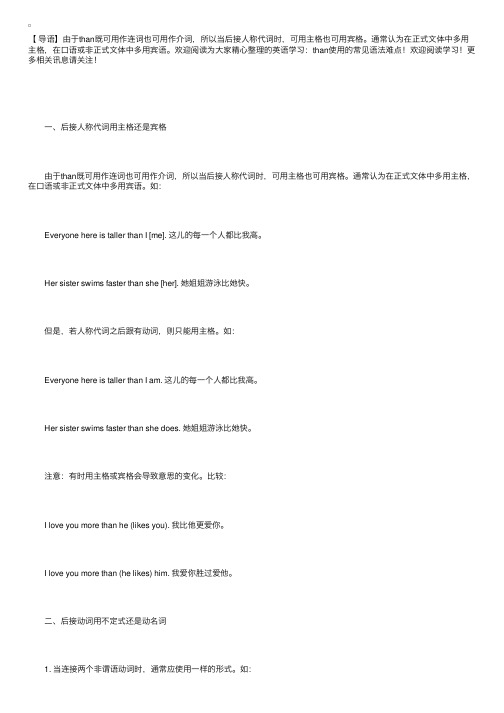
【导语】由于than既可⽤作连词也可⽤作介词,所以当后接⼈称代词时,可⽤主格也可⽤宾格。
通常认为在正式⽂体中多⽤主格,在⼝语或⾮正式⽂体中多⽤宾语。
欢迎阅读为⼤家精⼼整理的英语学习:than使⽤的常见语法难点!欢迎阅读学习!更多相关讯息请关注! ⼀、后接⼈称代词⽤主格还是宾格 由于than既可⽤作连词也可⽤作介词,所以当后接⼈称代词时,可⽤主格也可⽤宾格。
通常认为在正式⽂体中多⽤主格,在⼝语或⾮正式⽂体中多⽤宾语。
如: Everyone here is taller than I [me]. 这⼉的每⼀个⼈都⽐我⾼。
Her sister swims faster than she [her]. 她姐姐游泳⽐她快。
但是,若⼈称代词之后跟有动词,则只能⽤主格。
如: Everyone here is taller than I am. 这⼉的每⼀个⼈都⽐我⾼。
Her sister swims faster than she does. 她姐姐游泳⽐她快。
注意:有时⽤主格或宾格会导致意思的变化。
⽐较: I love you more than he (likes you). 我⽐他更爱你。
I love you more than (he likes) him. 我爱你胜过爱他。
⼆、后接动词⽤不定式还是动名词 1. 当连接两个⾮谓语动词时,通常应使⽤⼀样的形式。
如: It is much easier to get into debt than to get out of it. 借债容易还债难。
He likes playing chess more than watching TV. 与看电视相⽐,他更喜欢下棋。
⽐较: He thinks it is safer to drive himself than (to) let me drive. =He thinks that driving himself is safer than letting me drive. 他认为他⾃⼰开车⽐让我开车要更安全些。
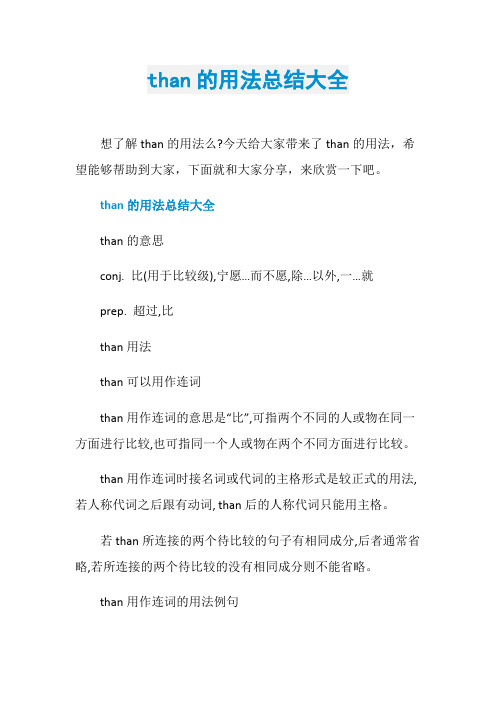
than的用法总结大全想了解than的用法么?今天给大家带来了than的用法,希望能够帮助到大家,下面就和大家分享,来欣赏一下吧。
than的用法总结大全than的意思conj. 比(用于比较级),宁愿…而不愿,除…以外,一…就prep. 超过,比than用法than可以用作连词than用作连词的意思是“比”,可指两个不同的人或物在同一方面进行比较,也可指同一个人或物在两个不同方面进行比较。
than用作连词时接名词或代词的主格形式是较正式的用法,若人称代词之后跟有动词, than后的人称代词只能用主格。
若than所连接的两个待比较的句子有相同成分,后者通常省略,若所连接的两个待比较的没有相同成分则不能省略。
than用作连词的用法例句She was older than I was.她年纪比我大。
I was inspired to work harder than ever before.我受激励比以往任何时候都更加努力地工作。
This street is four times shorter than that one.这条街道比那条短四倍。
than可以用作介词than用作介词时意思为“与…相比”,用于名词或代词前表示比较关系,也可用于在度量衡方面的比较。
than用作介词时其后接名词或代词的宾格形式是非正式用法,若人称代词之后有all, both则通常用宾格。
than用作介词的用法例句This street is four times shorter than that one.这条街道比那条短四倍。
John is more diligent than anyone else in his class.约翰比班上其他的同学用功。
than用法例句1、Their replies were no more than grunts of acknowledgement.他们所谓的回答不过是表示承认的咕哝罢了。
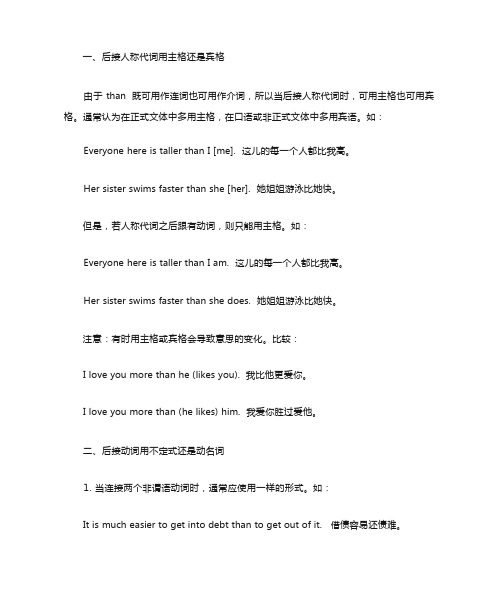
一、后接人称代词用主格还是宾格由于 than 既可用作连词也可用作介词,所以当后接人称代词时,可用主格也可用宾格。
通常认为在正式文体中多用主格,在口语或非正式文体中多用宾语。
如:Everyone here is taller than I [me]. 这儿的每一个人都比我高。
Her sister swims faster than she [her]. 她姐姐游泳比她快。
但是,若人称代词之后跟有动词,则只能用主格。
如:Everyone here is taller than I am. 这儿的每一个人都比我高。
Her sister swims faster than she does. 她姐姐游泳比她快。
注意:有时用主格或宾格会导致意思的变化。
比较:I love you more than he (likes you). 我比他更爱你。
I love you more than (he likes) him. 我爱你胜过爱他。
二、后接动词用不定式还是动名词1. 当连接两个非谓语动词时,通常应使用一样的形式。
如:It is much easier to get into debt than to get out of it. 借债容易还债难。
He likes playing chess more than watching TV . 与看电视相比,他更喜欢下棋。
比较:He thinks it is safer to drive himself than (to) let me drive.=He thinks that driving himself is safer than letting me drive. 他认为他自己开车比让我开车要更安全些。
2. 若不是连接两个非谓语动词,则其后出现的动词通常用动名词形式(虽然也可用不定式,但不如用动名词普通 )。
如:There are worse calamities than failing your driving test. 比起你驾驶考试不合格来说,更大的灾难还多着呢。